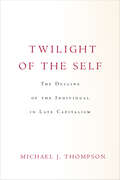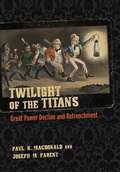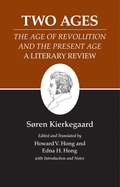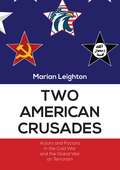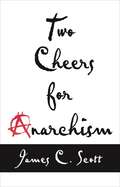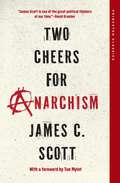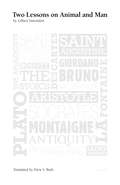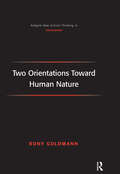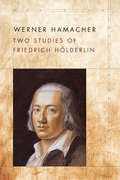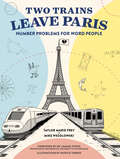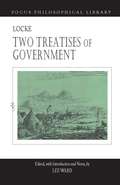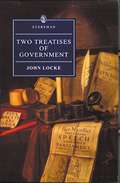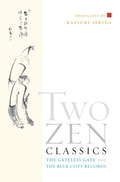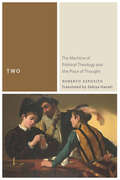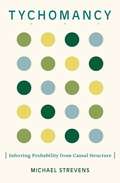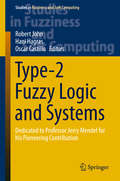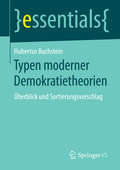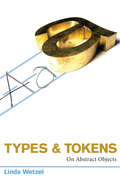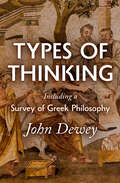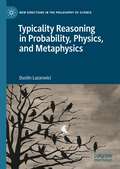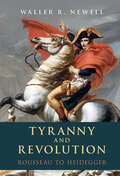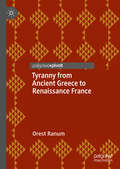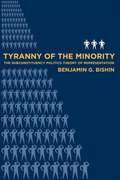- Table View
- List View
Twilight of the Self: The Decline of the Individual in Late Capitalism
by Michael ThompsonIn this new work, political theorist Michael J. Thompson argues that modern societies are witnessing a decline in one of the core building blocks of modernity: the autonomous self. Far from being an illusion of the Enlightenment, Thompson contends that the individual is a defining feature of the project to build a modern democratic culture and polity. One of the central reasons for its demise in recent decades has been the emergence of what he calls the "cybernetic society," a cohesive totalization of the social logics of the institutional spheres of economy, culture and polity. These logics have been progressively defined by the imperatives of economic growth and technical-administrative management of labor and consumption, routinizing patterns of life, practices, and consciousness throughout the culture. Evolving out of the neoliberal transformation of economy and society since the 1980s, the cybernetic society has transformed how that the individual is articulated in contemporary society. Thompson examines the various pathologies of the self and consciousness that result from this form of socialization—such as hyper-reification, alienated moral cognition, false consciousness, and the withered ego—in new ways to demonstrate the extent of deformation of modern selfhood. Only with a more robust, more socially embedded concept of autonomy as critical agency can we begin to reconstruct the principles of democratic individuality and community.
Twilight of the Titans: Great Power Decline and Retrenchment (Cornell Studies in Security Affairs)
by Paul K. MacDonald Joseph M. ParentIn this bold new perspective on the United States–China power transition, Paul K. MacDonald and Joseph M. Parent examine all great power transitions since 1870. They find that declining and rising powers have strong incentives to moderate their behavior at moments when the hierarchy of great powers is shifting. How do great powers respond to decline? they ask. What options do great powers have to slow or reverse their descent?In Twilight of the Titans, MacDonald and Parent challenge claims that policymakers for great powers, unwilling to manage decline through moderation, will be pushed to extreme measures. Tough talk, intimidation, provocation, and preventive war, they write, are not the only alternatives to defeat. Surprisingly, retrenchment tends not to make declining states tempting prey for other states nor does it promote domestic dysfunction. What retrenchment does encourage is resurrection. Only states that retrench have recovered their former position.MacDonald and Parent show how declining states tend to behave, what policy options they have to choose from, how rising states respond to decline, and what conditions reward which strategies. Using case studies that include Great Britain in 1872 and 1908, Russia in 1888 and 1903, and France in 1893 and 1924, Twilight of the Titans offers clear evidence that declining powers have a wide array of options at their disposal and offers guidance on how to use the right tools at the right time. The result is a comprehensive rethinking of power transition and hegemonic war theories and a different approach to the policy problems that declining states face. What matters most, the authors write, is the strategic choices made by the great powers.
Two Ages: The Age of Revolution and the Present Age
by Howard V. Hong Edna H. Hong Søren KierkegaardAfter deciding to terminate his authorship with the pseudonymous Concluding Unscientific Postscript, Kierkegaard composed reviews as a means of writing without being an author. Two Ages, here presented in a definitive English text, is simultaneously a review and a book in its own right. In it, Kierkegaard comments on the anonymously published Danish novel Two Ages, which contrasts the mentality of the age of the French Revolution with that of the subsequent epoch of rationalism. Kierkegaard commends the author's shrewdness, and his critique builds on the novel's view of the two generations. With keen prophetic insight, Kierkegaard foresees the birth of an impersonal cultural wasteland, in which the individual will either be depersonalized or obliged to find an existence rooted in "equality before God and equality with all men. " This edition, like all in the series, contains substantial supplementary material, including a historical introduction, entries from Kierkegaard's journals and papers, and the preface and conclusion of the original novel.
Two American Crusades: Actors and Factors in the Cold War and the Global War on Terrorism
by Marian LeightonHere is the first in-depth analysis and comparison of U.S. policy in two seminal conflicts of our recent history: the Cold War and the Global War on Terrorism. Unlike previous publications, which deal with each conflict separately, Two American Crusades t
Two Cheers for Anarchism: Six Easy Pieces on Autonomy, Dignity, and Meaningful Work and Play
by James C. ScottA spirited defense of the anarchist approach to lifeJames Scott taught us what's wrong with seeing like a state. Now, in his most accessible and personal book to date, the acclaimed social scientist makes the case for seeing like an anarchist. Inspired by the core anarchist faith in the possibilities of voluntary cooperation without hierarchy, Two Cheers for Anarchism is an engaging, high-spirited, and often very funny defense of an anarchist way of seeing—one that provides a unique and powerful perspective on everything from everyday social and political interactions to mass protests and revolutions. Through a wide-ranging series of memorable anecdotes and examples, the book describes an anarchist sensibility that celebrates the local knowledge, common sense, and creativity of ordinary people. The result is a kind of handbook on constructive anarchism that challenges us to radically reconsider the value of hierarchy in public and private life, from schools and workplaces to retirement homes and government itself.Beginning with what Scott calls "the law of anarchist calisthenics," an argument for law-breaking inspired by an East German pedestrian crossing, each chapter opens with a story that captures an essential anarchist truth. In the course of telling these stories, Scott touches on a wide variety of subjects: public disorder and riots, desertion, poaching, vernacular knowledge, assembly-line production, globalization, the petty bourgeoisie, school testing, playgrounds, and the practice of historical explanation.Far from a dogmatic manifesto, Two Cheers for Anarchism celebrates the anarchist confidence in the inventiveness and judgment of people who are free to exercise their creative and moral capacities.
Two Cheers for Anarchism: Six Easy Pieces on Autonomy, Dignity, and Meaningful Work and Play (Princeton Classics)
by James C. Scott&“One of the world&’s most widely read social scientists&” (New York Times) offers his most personal and accessible book—a celebration of how ordinary people can resist oppression and injusticeJames Scott taught us what's wrong with seeing like a state. Now, in his most accessible and personal book to date, the acclaimed social scientist makes the case for seeing like an anarchist. Inspired by the core anarchist faith in the possibilities of voluntary cooperation without hierarchy, Two Cheers for Anarchism is an engaging, high-spirited, and often very funny defense of an anarchist way of seeing—one that provides a unique and powerful perspective on everything from everyday social and political interactions to mass protests and revolutions. Through a wide-ranging series of memorable anecdotes and examples, the book describes an anarchist sensibility that celebrates the local knowledge, common sense, and creativity of ordinary people. The result is a kind of handbook on constructive anarchism that challenges us to radically reconsider the value of hierarchy in public and private life, from schools and workplaces to retirement homes and government itself.Beginning with what Scott calls "the law of anarchist calisthenics," an argument for law-breaking inspired by an East German pedestrian crossing, each chapter opens with a story that captures an essential anarchist truth. In the course of telling these stories, Scott touches on a wide variety of subjects: public disorder and riots, desertion, poaching, vernacular knowledge, assembly-line production, globalization, the petty bourgeoisie, school testing, playgrounds, and the practice of historical explanation.Far from a dogmatic manifesto, Two Cheers for Anarchism celebrates the anarchist confidence in the inventiveness and judgment of people who are free to exercise their creative and moral capacities.
Two Lessons on Animal and Man (Univocal)
by Gilbert SimondonSimondon is a secret password among certain discussions within philosophy today. As a philosopher of technology, Simondon&’s work has a place at the forefront of current thinking in media, technology, psychology, and philosophy with complex accounts of man&’s relationship to technology and the realm that continues to form itself via this tension between man and his technical universe. In this introduction to Simondon&’s oeuvre, the reader has access to the grounding of one of the most fundamental and critical questions that has been the focus of philosophy for millennia: the relationship between man and animal.
Two Orientations Toward Human Nature (Ashgate New Critical Thinking in Philosophy)
by Rony GuldmannOur culture entertains a schizophrenic attitude towards human nature. On the one hand, egoism is held to be our most powerful motive, playing a crucial cultural role by explaining the appeal of capitalism and providing a foundation for individualism. By contrast much of the continental intellectual tradition speaks of wholeness and alienation, seeing human nature not as self-interested but as herd-like. Guldmann argues that this schism reflects two diverging conceptions of human agency, and that the attempt to locate human nature somewhere along a continuum between egoism and altruism presupposes a misleading picture of what it is to be a human being. The second, ’continental’ tradition is more illuminating because it recognizes that human beings are necessarily committed to some conception of the ultimately significant.
Two Studies of Friedrich Hölderlin (Meridian: Crossing Aesthetics)
by Werner HamacherTwo Studies of Friedrich Hölderlin shows how the poet enacts a radical theory of meaning that culminates in a unique and still groundbreaking concept of revolution, one that begins with a revolutionary understanding of language. The product of an intense engagement with both Walter Benjamin and Jacques Derrida, the book presents Werner Hamacher's major attempts at developing a critical practice commensurate with the immensity of Hölderlin's late writings. These essays offer an incisive and innovative combination of critical theory and deconstruction while also identifying where influential critics like Heidegger fail to do justice to the poet's astonishing radicality. Readers will not only come away with a new appreciation of Hölderlin's poetic and political-theoretical achievements but will also discover the motivating force behind Hamacher's own achievements as a literary scholar and political theorist. An introduction by Julia Ng and an afterword by Peter Fenves provide further information about these studies and the academic and theoretical context in which they were composed.
Two Trains Leave Paris: Number Problems for Word People
by Taylor Frey Mike WesolowskiEntertaining word problems that let verbal types master the language of math!Math is a universal language, but it’s also the least understood and most undervalued subject taught in school. Two Trains Leave Paris: Number Problems for Word People offers an opportunity to experience math like never before. You must use the Pythagorean Theorem to figure out how far apart two ex-lovers are when they simultaneously realize that they cannot live without each other. You must use addition (and logic) to explore the ridiculous (and patriarchal!) wage gap. Throughout six math-themed chapters, readers will follow a series of characters as they apply for jobs, fall in love, get abducted by aliens, and experience many of life’s other big and small moments, all of which are dictated by—you guessed it—math! With the help of humor, mathematical history, and how-to-solve sections, Two Trains Leave Paris asks readers to help its characters find growth in the most unexpected of places: word problems. And the answers are, of course, in the back.
Two Treatises of Government
by John Locke Lee WardDesigned to serve the needs of students confronting Locke's political thought for the first time, Lee Ward's edition offers a faithful text of Two Treatises of Government with modernized spelling and punctuation. Its Editor's Introduction outlines the main arguments of these works, illustrates the conceptual thread uniting the less frequently read First Treatise with the far more famous Second Treatise, and locates Locke's work amid the turbulent constitutional battles of 1690s England. Helpful notes at the foot of the page, a Thematic Index, and an up-to-date Bibliography are also provided.
Two Treatises of Government
by John Locke Mark GoldieThis is the first modernized edition of the Two Treatises based on Locke's own corrected text as he left it for posterity at his death. Includes introduction, chronology of Locke's life and times, extensive glossary and key word index.
Two Zen Classics
by Katsuki SekidaThe strange verbal paradoxes called koans have been used traditionally in Zen training to help students attain a direct realization of truths inexpressible in words. The two works translated in this book, Mumonkan (The Gateless Gate ) and Hekiganroku (The Blue Cliff Record), both compiled during the Song dynasty in China, are the best known and most frequently studied koan collections, and are classics of Zen literature. They are still used today in a variety of practice lineages, from traditional zendos to modern Zen centers. In a completely new translation, together with original commentaries, the well-known Zen teacher Katsuki Sekida brings to these works the same fresh and pragmatic approach that made his Zen Training so successful. The insights of a lifetime of Zen practice and his familiarity with both Eastern and Western ways of thinking make him an ideal interpreter of these texts.
Two: The Machine of Political Theology and the Place of Thought (Commonalities)
by Roberto EspositoThe debate on “political theology” that ran throughout the twentieth century has reached its end, but the ultimate meaning of the notion continues to evade us. Despite all the attempts to resolve the issue, we still speak its language—we remain in its horizon.The reason for this, says Roberto Esposito, lies in the fact that political theology is neither a concept nor an event; rather, it is the pivot around which the machine of Western civilization has revolved for more than 2,000 years. At its heart stands the juncture between universalism and exclusion, unity and separation: the tendency of the Two to make itself into One by subordinating one part to the domination of the other. All the philosophical and political categories that we use, starting with the Roman and Christian notion of “the person,” continue to reproduce this exclusionary dispositif.To take our departure from political theology, then—the task of contemporary philosophy—we must radically revise our conceptual lexicon. Only when thought has been returned to its rightful “place”—connected to the human species as a whole rather than to individuals—will we be able to escape from the machine that hasimprisoned our lives for far too long.
Tychomancy
by Michael StrevensTychomancy-meaning the divination of chances-presents a set of rules for inferring the physical probabilities of outcomes from the causal or dynamic properties of the systems that produce them. Probabilities revealed by the rules are wide-ranging: they include the probability of getting a 5 on a die roll, the probability distributions found in statistical physics, and the probabilities that underlie many prima facie judgments about fitness in evolutionary biology. Michael Strevens makes three claims about the rules. First, they are reliable. Second, they are known, though not fully consciously, to all human beings: they constitute a key part of the physical intuition that allows us to navigate around the world safely in the absence of formal scientific knowledge. Third, they have played a crucial but unrecognized role in several major scientific innovations. A large part of Tychomancy is devoted to this historical role for probability inference rules. Strevens first analyzes James Clerk Maxwell’s extraordinary, apparently a priori, deduction of the molecular velocity distribution in gases, which launched statistical physics. Maxwell did not derive his distribution from logic alone, Strevens proposes, but rather from probabilistic knowledge common to all human beings, even infants as young as six months old. Strevens then turns to Darwin’s theory of natural selection, the statistics of measurement, and the creation of models of complex systems, contending in each case that these elements of science could not have emerged when or how they did without the ability to eyeball the values of physical probabilities.
Type Theory and Formal Proof
by Rob Nederpelt Herman GeuversType theory is a fast-evolving field at the crossroads of logic, computer science and mathematics. This gentle step-by-step introduction is ideal for graduate students and researchers who need to understand the ins and outs of the mathematical machinery, the role of logical rules therein, the essential contribution of definitions and the decisive nature of well-structured proofs. The authors begin with untyped lambda calculus and proceed to several fundamental type systems, including the well-known and powerful Calculus of Constructions. The book also covers the essence of proof checking and proof development, and the use of dependent type theory to formalise mathematics. The only prerequisite is a basic knowledge of undergraduate mathematics. Carefully chosen examples illustrate the theory throughout. Each chapter ends with a summary of the content, some historical context, suggestions for further reading and a selection of exercises to help readers familiarise themselves with the material.
Type-2 Fuzzy Logic and Systems: Dedicated to Professor Jerry Mendel for his Pioneering Contribution (Studies in Fuzziness and Soft Computing #362)
by Oscar Castillo Hani Hagras Robert JohnThis book explores recent perspectives on type-2 fuzzy sets. Written as a tribute to Professor Jerry Mendel for his pioneering works on type-2 fuzzy sets and systems, it covers a wide range of topics, including applications to the Go game, machine learning and pattern recognition, as well as type-2 fuzzy control and intelligent systems. The book is intended as a reference guide for the type-2 fuzzy logic community, yet it aims also at other communities dealing with similar methods and applications.
Typen moderner Demokratietheorien: Überblick und Sortierungsvorschlag (essentials)
by Hubertus BuchsteinDas essential bietet einen kompakten Überblick über die neuere Entwicklung der Demokratietheorie und nimmt eine prägnante Sortierung der gegenwärtigen Theorien in diesem Bereich vor. Hubertus Buchstein erläutert die methodischen Unterschiede zwischen den konkurrierenden demokratietheoretischen Ansätzen und stellt vier grundlegende Typen moderner Demokratietheorien vor: historische, empirische, formale und normative Demokratietheorien. Viele Debatten in der Öffentlichkeit, der Politischen Bildung und der Politikwissenschaft über die Demokratie lassen sich mit mehr Gewinn führen, wenn man die unterschiedlichen Blickwinkel der vier Typen beachtet. Dieses essential liefert einen wichtigen Beitrag dazu.
Types and Tokens: On Abstract Objects
by Linda WetzelA consideration of the distinction between the spatiotemporal furniture of the world (tokens) and the types of which they are instances, and an argument that types exist.There is a widely recognized but infrequently discussed distinction between the spatiotemporal furniture of the world (tokens) and the types of which they are instances. Words come in both types and tokens—for example, there is only one word type 'the' but there are numerous tokens of it on this page—as do symphonies, bears, chess games, and many other types of things. In this book, Linda Wetzel examines the distinction between types and tokens and argues that types exist (as abstract objects, since they lack a unique spatiotemporal location). Wetzel demonstrates the ubiquity of references to (and quantifications over) types in science and ordinary language; types have to be reckoned with, and cannot simply be swept under the rug. Wetzel argues that there are such things as types by undermining the epistemological arguments against abstract objects and offering extended original arguments demonstrating the failure of nominalistic attempts to paraphrase away such references to (and quantifications over) types. She then focuses on the relation between types and their tokens, especially for words, showing for the first time that there is nothing that all tokens of a type need have in common other than being tokens of that type. Finally, she considers an often-overlooked problem for realism having to do with types occurring in other types (such as words in a sentence) and proposes an important and original solution, extending her discussion from words and expressions to other types that structurally involve other types (flags and stars and stripes; molecules and atoms; sonatas and notes).
Types of Thinking Including a Survey of Greek Philosophy
by John DeweyA lost series of lectures on the history of philosophy, first delivered in China, now available in English for the first time.This volume reconstructs a series of lectures delivered by John Dewey during his historic trip to China. Though Dewey&’s original notes were lost, Prof. Robert W. Clopton and Dr. Tsuin-Chen Ou were able to translate his works as they appeared in Chinese newspapers.Beyond their historical significance, these lectures show Dewey at the height of his power, discussing and criticizing various schools of philosophy. This includes a brief but comprehensive account of Greek philosophy from the pre-Socratics through Aristotle. Dewey also discusses his own experimental thinking, presenting his position in systematic form for the first time. &“The most complete presentation of Dewey&’s theory of the development of philosophy, in prose simpler and clearer than he himself ever provided . . . Types of Thinking deserves a place in every subject collection.&” —Library Journal
Typicality Reasoning in Probability, Physics, and Metaphysics (New Directions in the Philosophy of Science)
by Dustin LazaroviciThis book provides a comprehensive investigation into the concept of typicality and its significance for physics and the philosophy of science. It identifies typicality as a fundamental way of reasoning, central to how natural laws explain and are tested against phenomena. The book discusses various applications of typicality to foundational questions in physics and beyond.These include:a unified interpretation of objective probabilities in classical mechanics and quantum mechanicsa detailed discussion of Boltzmann's statistical mechanics, entropy, and the second law of thermodynamicsa novel account of the asymmetry of causation and the arrow of time Finally, the book turns to the question: "What are laws of nature"? It argues that typicality extends to a powerful way of reasoning in metaphysics that can and should inform our commitments about the fundamental ontology of the world. On this basis, it develops an argument against the Humean best system account, according to which laws of nature are merely an efficient summary of contingent regularities.
Tyranny and Revolution: Rousseau to Heidegger
by Waller R. NewellThe Philosophy of Freedom from Rousseau to Heidegger launched a great protest against modern liberal individualism, inspired by the virtuous political community of the ancient Greeks. Hegel argued that the progress of history was gradually bringing about greater freedom and restoring our lost sense of community. But his successors Marx, Nietzsche and Heidegger rejected Hegel's version of the end of history with its legitimization of the bourgeois nation-state. They sought to replace it with ever more utopian, apocalyptic and illiberal visions of the future: Marx's Socialism, Nietzsche's Overman, and Heidegger's commitment to Nazism. This book combines an exceptionally clear and rich study of these thinkers with a deep dive into the extent to which their views fed the political catastrophes of revolution, tyranny and genocide, including the Jacobins, Bolsheviks, Nazis, Khmer Rouge, ISIS and populist nationalism, but argues that the Philosophy of Freedom remains indispensable for understanding today's world.
Tyranny from Ancient Greece to Renaissance France
by Orest RanumThis Palgrave Pivot examines how prominent thinkers throughout history, from ancient Greece to sixteenth-century France, have perceived tyrants and tyranny. Ancient philosophers such as Plato and Aristotle were the first to build a vocabulary for tyrants and the forms of government they corrupted. Thirteenth century analyses of tyranny by Thomas Aquinas and John of Salisbury, revived from Antiquity, were recast as short observations about what tyrants do. They claimed that tyrants govern for their own advantage, not for the people. Tyrants could be usurpers, increase taxes, and live in luxury. The list of tyrannical actions grew over time, especially in periods of turmoil and civil war, often raising the question: When can a tyrant be legitimately deposed or killed? In offering a brief biography of these political philosophers, including Machiavelli, Erasmus, More, Bodin, and others, along with their views on tyrannical behavior, Orest Ranum reveals how the concept of tyranny has been shaped over time, and how it still persists in political thought to this day.
Tyranny of the Minority: The Subconstituency Politics Theory of Representation
by Benjamin G. BishinWhy do politicians frequently heed the preferences of small groups of citizens over those of the majority? Breaking new theoretical ground, Benjamin Bishin explains how the desires of small groups, which he calls "subconstituencies," often trump the preferences of much larger groups. Demonstrating the wide applicability of his "unified theory of representation," Bishin traces politicians' behavior in connection with a wide range of issues, including the Cuban trade embargo, the extension of hate-crimes legislation to protect gay men and lesbians, the renewal of the assault-weapons ban, and abortion politics. In the process, he offers a unique explanation of when, why, and how special interests dominate American national politics.
Tyranny: A New Interpretation
by Waller R. NewellThis is the first comprehensive exploration of ancient and modern tyranny in the history of political thought. Waller R. Newell argues that modern tyranny and statecraft differ fundamentally from the classical understanding. Newell demonstrates a historical shift in emphasis from the classical thinkers' stress on the virtuous character of rulers and the need for civic education to the modern emphasis on impersonal institutions and cold-blooded political method. By diagnosing the varieties of tyranny from erotic voluptuaries like Nero, the steely determination of reforming conquerors like Alexander the Great and Julius Caesar and modernizing despots such as Napoleon and Ataturk to the collectivist revolutions of the Jacobins, Bolsheviks, Nazis and Khmer Rouge, Newell shows how tyranny is every bit as dangerous to free democratic societies today as it was in the past.
